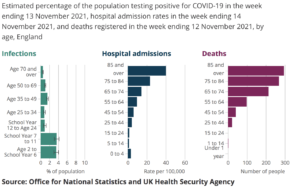Mass youth vaccination could never protect older and medically vulnerable people as effectively as would ensuring that all those older and medically vulnerable people themselves receive the jab.
Unlike lockdowns and other restrictions, vaccination is a very low cost and low-risk act that can be very beneficial to many people. It is safest, fairer and most effective when it is properly targeted, considering the risks and benefits of the vaccine for different groups.

We think mandatory vaccination should be extended beyond the NHS, but with important qualifications.
‘Mandatory’ means that there would be penalties for failing to get vaccinated, such as fines or limitations on people’s freedom to mix socially. We should exercise the lowest level of restriction that would allow us to achieve the goal of protecting the NHS. By Alberto Giubilini and Julian Savulescu
People are clearly fed up with losing their liberties. Indeed, more liberties may soon be taken away from people: in Austria, the authorities say they will make Covid vaccination mandatory for almost everyone from February 1. It’s also being reported that Germany may follow suit.
But unlike mandatory vaccination, lockdown entails very large and arguably now unacceptable individual and social costs. It is inconsistent to accept mandatory lockdown for everyone but reject mandatory vaccination for a selected group. Such vaccination – carefully targeted at the most vulnerable groups – can achieve a much greater good for everyone, at a much smaller cost.
As resurgent Covid-19 spreads rapidly across Europe, in countries such as Austria and the Netherlands the authorities are re-imposing lockdowns. And in response thousands are marching – and rioting.
These are the people who are most likely to be hospitalised by Covid if they catch it and therefore to compromise health care for every one else.
Thus, the second qualification is that mandatory vaccination should be introduced for certain groups of people; that is, older people and those who are medically vulnerable and who do not have immunity yet, for instance from previous infection.
Last year we all had to endure months of lockdown, which was mandatory for everyone. Exactly as with mandatory vaccination, the aim of lockdown was to protect vulnerable people from Covid.
We must do what we reasonably can to keep them out of hospital in the first place, by ensuring they get protected by vaccination.
And while vaccinating younger people does help to prevent them from spreading the virus, the beneficial effect is not actually that great. You would need a sufficiently large collective benefit to impose a risk on children, but at the moment that collective benefit of vaccines in terms of stopping contagion does not seem to be very large and it wanes very quickly, after 3 months..
All those people’s care became neglected in the desperate rush to contain the Covid pandemic in Britain. Now we must care for them and protect them before it’s too late.
The first qualification is that, if we want to build up immunity in certain groups, we need to take into account natural immunity and, if it is at least as good as vaccine-induced immunity, target with vaccination policies only those who do not have that yet.
With concerns about the growing pressure that rising Covid numbers could put on a health service already struggling with a huge backlog of patients as well as the burden of winter illnesses such as flu, the Health Secretary has already announced that jabs will be mandatory for front line heath care workers and social care workers service workers from April next year.
It is true that if everyone was subjected to mandatory vaccination and locked down in their homes, COVID deaths would be minimised. But we must balance the value of liberty against the public good of public health. So far we have used a sledge hammer to crack a nut. We should consider less liberty restricting measures which reasonably contain COVID, such as selective mandatory vaccination (and incentives – as we have suggested elsewhere)
Any jab carries a small risk of harmful side-effects. In a very small minority of cases that can be risky. So why expose young people to that risk, if they run almost no risk at all of being harmed by Covid infection?
Importantly, when we say ‘mandatory vaccination’, we don’t mean forced vaccination, where people are physically restrained and inoculated against their will.
Should the UK do the same?
Unless they fall into a high-risk medical category, we cannot see a reason for extending mandatory vaccination to younger age groups. We wouldn’t and shouldn’t make vaccination mandatory for children – the same applies to young people and arguably up to those who are 50 or 60. Indeed, we think that it would be unethical to mandatorily vaccinate young people who are unlikely to become hospitalised by the infection.
We would need precise research to identify the people to target for mandatory Covid-19 jabs, but we would expect from the evidence available so far, that they would include groups such as the over-50s, and people with health conditions that make them vulnerable, such as respiratory illnesses, diabetes, high blood pressure and heart failure.
The priority here is to defend our health system. To protect staff and patients. Overwhelming the NHS risks compromising health care delivery and availability for each of us. Not only Covid patients, but the millions who are now having to endure unprecedentedly long waits for vital non-Covid care: people with cancer, people with heart disease, people whose survival chances shrink further every time someone gets infected with Covid and occupies a hospital bed.